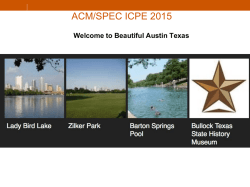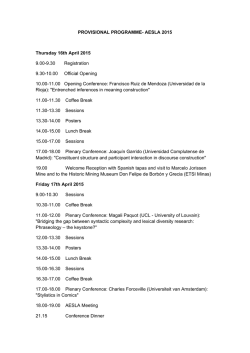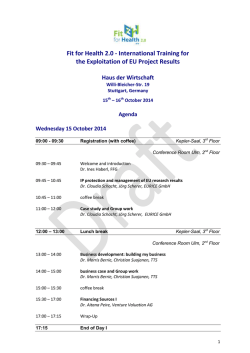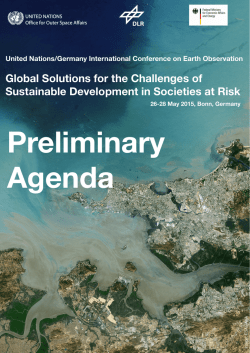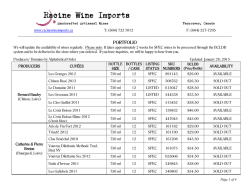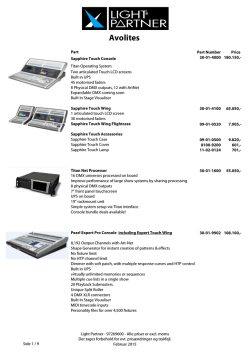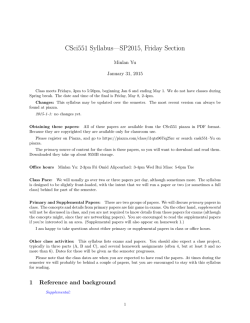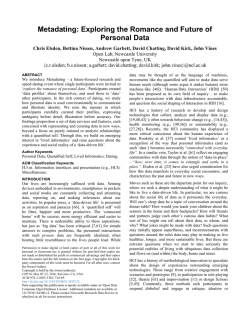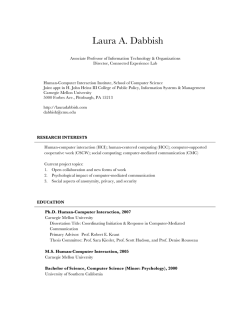
Full Program as PDF - ICPE 2015
CONFERENCE PROGRAM JANUARY 31 - FEBRUARY 4, 2015 AUSTIN, TX, USA ICPE 2015 THE 6TH ACM/SPEC INTERNATIONAL CONFERENCE ON PERFORMANCE ENGINEERING Standard Performance Evaluation Corporation Welcome Dear Conference Participants, It is our pleasure to welcome you to Austin and the ACM/SPEC International Conference on Performance Engineering, ICPE 2015. ICPE is a merger of ACM’s Workshop on Software and Performance (WOSP) and SPEC’s International Performance Evaluation Workshop (SIPEW). The focus of WOSP is in the intersection of software and performance, rather than one discipline in isolation. Since its inception in 1998, WOSP has brought together software engineers, developers, performance analysts and software performance engineers who are addressing the challenges of increasing system complexity, rapidly evolving software technologies, short time to market, incomplete documentation, and less-thanadequate methods, models and tools for developing, modeling, and measuring scalable, high-performance software. SIPEW, which is part of the SPEC Benchmark Workshop Series, was established by the Standard Performance Evaluation Corporation (SPEC) with the goal to bridge the gap between theory and practice in the field of system performance evaluation, by offering a forum for sharing ideas and experiences between industry and academia. The workshop provides a platform for researchers and industry practitioners to share and present their experiences, discuss challenges, and report state-of-the-art and inprogress research in all aspects of performance evaluation including both hardware and software issues. The ACM/SPEC International Conference on Performance Engineering (ICPE) brings together the WOSP and SIPEW communities building on their common interests and complementary nature. ACM’s membership consists of individuals from academia, industry, and government worldwide. SPEC’s membership consists of industrial organizations, universities and research institutes. We are continuing to bridge the two communities to build on each other’s experience, energy, and expertise. This year we have we have continued the tracks that have worked well in the past: the research track, an explicit industrial applications and experience track with a separate program committee, a work-in-progress and vision track, and demos and posters. We have also expanded the pre-conference Workshops and Tutorials. Overall, 56 submissions were received in the main research and industrial tracks and there were over 116 submissions in all the tracks. The accepted papers cover a range of different topics in performance engineering with a good balance between theoretical and practical contributions from both industry and academia. We would like to thank Catalina Lladó, Kai Sachs, and Herb Schwetman for chairing the research and industrial program committees; William Knottenbelt and Yaomin Chen for the demos and posters; Catia Trubiani for the tutorials; Marin Litoiu and J. Nelson Amaral for the workshops; and and Zhibin Yu for trying to organize a new Ph.D. Workshop. We are grateful to these chairs and the many reviewers for putting together an excellent conference program. We would also like to thank all the other Chairs for their excellent assistance in organizing all the other aspects of the conference: Simona Bernardi - publications, Anoush Najarian finance, Amy Spellmann and Andre van Hoorn – publicity and web site management, Ram Krishnan - registration, Andre Bondi and Paul Gratz - awards, and Nasr Ullah - local organization. Everyone brought a level of excellency and commitment to their job. We appreciate their hard work and commitment to making ICPE a success. Thanks also to Dianne Rice from SPEC for providing administrative support, as well as to Diana Brantuas, April Mosqus, Stephanie Sabal, Adrienne Griscti and others at ACM Headquarters for their continuous support. Special thanks also to Lisa Tolles from the ACM-Sheridan Proceedings Service for processing the papers in a timely manner. Finally, we would like to acknowledge the support and guidance of the ICPE Steering Committee. Last but not least, we thank our sponsors SPEC, ACM SIGMETRICS and ACM SIGSOFT, and our generous corporate supporter Oracle. On behalf of the organizing committee, we welcome you to Austin. Thank you for joining us and we look forward to a mutually rewarding experience. Lizy K. John University of Texas at Austin, USA ICPE’15 General Co-Chair (SPEC) Connie U. Smith L&S Computer Technology, Inc., USA ICPE’15 General Co-Chair (ACM) Program at a Glance Saturday, January 31, 2015 Tutorials Room: RIO GRANDE 7:30 8:00 – 10:00 10:00 - 10:30 10:30 - 12:30 12:30 - 13:30 Registration Load Testing Large-Scale Software Systems Coffee Break @ EMC Foyer Dos and Don’ts of Conducting Performance Measurements in Java Lunch on your own 13:30 - 15:00 Platform Selection and Performance Engineering for Graph Processing on Parallel and Distributed Platforms Part I 15:00 - 15:30 Coffee Break @ EMC Foyer 15:30 - 17:00 Platform Selection and Performance Engineering for Graph Processing on Parallel and Distributed Platforms Part II WOSP-C 2015 Workshop Room: SABINE 7:30 Registration 8:30 - 10:00 10:00 - 10:30 10:30 - 12:00 12:00 - 13:30 13:30 - 15:00 15:00 - 15:30 15:30 - 17:00 Session 1 Coffee Break @ EMC Foyer Session 2 Lunch on your own Session 3 Coffee Break @ EMC Foyer Session 4 Program at a Glance Sunday, February 1, 2015 Tutorials 7:30 8:30 – 12:30 Registration Hybrid Machine Learning/Analytical Models for Performance Prediction Room: TRINITY 12:30 - 13:30 13:30 - 17:00 Lunch on your own The CloudScale Method for Software Scalability, Elasticity, How to build a benchmark and Efficiency Engineering Room: RIO GRANDE Room: TRINITY Morning Coffee Break @ EMC Foyer 10:30 – 11 am Afternoon Coffee Break @ EMC Foyer 3:00 – 3:30 pm Workshops LT 2015 Workshop PABS Workshop Room: SABINE 9 am 7:30 8:15 - 12:30 12:00 - 13:30 13:30 - 17:00 Room: RIO GRANDE 8:15 am Registration Morning Session @ 9 am Morning Session @ 8:15 am Lunch on your own Afternoon Session NA Morning Coffee Break @ EMC Foyer 10:10 am (LT) and 10:40 am (PABS) Afternoon Coffee Break @ EMC Foyer 3:00 – 3:30 pm Note: Start, end and break times vary between different tutorials and workshops. Check each event schedule for exact times. Program at a Glance Monday, February 2, 2015 Main Conference 7:30 - 8:30 8:30 - 9:00 9:00 - 10:00 10:00 - 10:30 10:30 - 12:10 12:10 - 13:30 13:30 - 15:05 15:05 - 15:30 15:30 - 16:00 16:00 - 17:00 Room: SABINE/RIO GRANDE Registration Welcome Message Keynote 1 Coffee Break @ EMC Foyer Best Paper Candidates Lunch @ Creekside Dinning (first floor in the hotel) Performance Measurements and Experimental Analysis Coffee Break Tool Presentation Tool/Demo/Poster Session Tuesday, February 3, 2015 Main Conference 7:30 - 8:30 8:30 - 9:30 9:30 - 10:00 10:00 - 11:15 11:15 - 12:15 12:15 - 13:30 13:30 - 14:50 14:50 - 15:20 15:20 - 16:30 16:30 - 16:55 18:30- 21:30 Room: SABINE/RIO GRANDE Registration Keynote 2 Coffee Break @ EMC Foyer Big Data & Database Performance Modeling and Prediction I Lunch @ Creekside Dinning (first floor in the hotel) Performance Methods in Software Development Coffee Break @ EMC Foyer Performance & Power Web Performance th Conference Banquet Event @ Esther Follies 525 E. 6 street Program at a Glance Wednesday, February 4, 2015 Main Conference Room: SABINE 7:30 - 8:30 Registration 8:30 - 10:20 Benchmarks and Empirical Studies – Workloads, Scenarios and Implementations 10:20 - 10:50 10:50 - 11:10 11:10 - 12:15 12:15 Coffee Break @ EMC Foyer SPEC Distinguished Dissertation Award Performance Modeling and Prediction II Closing Remarks WOSP-C 2015 Workshop – Saturday, January 31 Workshop on Challenges in Performance Methods for Software Development This one-day workshop will explore the new challenges to product performance that have arisen due to changes in software and in the development process. For example, faster development means less time for performance planning, the need for scalability and adaptability increases the pressure while introducing new sources of delay in the use of middleware, model-driven engineering, component engineering and software development tools offer opportunities but their exploitation requires effort and carries risks. The workshop will seek to identify the most promising lines of research to address these challenges, through a combination of research and experience papers, vision papers describing new initiatives and ideas, and discussion sessions. Papers describing new projects and approaches are particularly welcome. As implied by the title, the workshop will consider methods usable anywhere across the life cycle, from requirements to design, testing and evolution of the product. There will be sessions, which combine papers on research/experience/vision with substantial discussion on issues raised by the papers or the attendees. About a third of the time will be devoted to discussion on identifying the key problems and the most fruitful lines of future research. Welcome and Invited Talk 8:30 -8:35 Introduction and Chair’s Welcome Session 1: Chair: Dorina Petriu (Carleton University) 8:35 -10:00 Contributed Papers Software Performance Engineering Then and Now: A Position Paper. Connie U. Smith (Performance Engineering Services) Towards a DevOps Approach for Software Quality Engineering. Juan F. Pérez, Weikun Wang, Giuliano Casale (Imperial College) Autoperf: Workflow Support for Performance Experiments. Xiaoguang Dai, Boyana Norris, Allen Malony (University of Oregon) Runtime Performance Challenges in Big Data Systems. John Klein, Ian Gorton (Software Engineering Institute) 10:00 - 10:30 Coffee Break Session 2: Chair: Giuliano Casale (Imperial College) WOSP-C 2015 Workshop – Saturday, January 31 10:30 - 12:00 Discussion Session on Challenges 12:00 - 13:30 Lunch Session 3: Chair: Davide Arcelli, (L’Aquila) 13:30 - 15:00 Contributed Papers Performance Antipattern Detection through fUML Model Library. Davide Arcelli, Luca Berardinelli (Università Degli Studi L'Aquila), Catia Trubiani (Gran Sasso Science Institute, L’Aquila) Beyond Simulation: Composing Scalability, Elasticity, and Efficiency Analyses from Preexisting Analysis Results. Sebastian Lehrig , Steffen Becker (Chemnitz University of Technology) Integrating Formal Timing Analysis in the Real-Time Software Development Process. Rafik Henia, Laurent Rioux, Nicolas Sordon, Gérald-Emmanuel Garcia, Marco Panunzio (Thales) Challenges in Integrating the Analysis of Multiple Non-Functional Properties in Model-Driven Software Engineering Dorina Petriu (Carleton University) 15:00 - 15:30 Coffee Break Session 4: Chair: Connie Smith, Performance Engineering Services 15:30 -17:00 Discussion Session on Research Opportunities 17:00 Closing and Workshop Summary Tutorials – Saturday January 31 08:00 - 10:00 Tutorial 1 Load Testing Large-Scale Software Systems Zhen Ming (Jack) Jiang, York University, Toronto, ON, Canada 10:00 - 10:30 Coffee Break 10:30 - 12:30 Tutorial 2 Dos and Don’ts of Conducting Performance Measurements in Java Jeremy Arnold (IBM) 12:30 - 13:30 Lunch 13:30 - 15:00 Tutorial 3 - Part I Platform Selection and Performance Engineering for Graph Processing on Parallel and Distributed Platforms Ana Lucia Varbanescu, University of Amsterdam, NL and Alexandru Iosup, Delft University of Technology, NL 15:00 - 15:30 Coffee Break 15:30 - 17:00 Tutorial 3 - Part 2 Platform Selection and Performance Engineering for Graph Processing on Parallel and Distributed Platforms Ana Lucia Varbanescu, University of Amsterdam, NL and Alexandru Iosup, Delft University of Technology, NL PABS 2015 Workshop – Sunday February 1 Workshop on Performance Analysis of Big Data Systems Big data systems deal with velocity, variety, volume and veracity of the application data. We witness an explosive growth in the complexity, diversity, number of deployments and capabilities of big data processing systems such as Map-Reduce, Cassandra, Big Table, HPCC, Hyracks, Dryad, Pregel and Mongo DB. The big data system may use new operating system designs, advanced data processing algorithms, parallelization of application, high performance architectures and clusters to improve the performance. Looking at the volume of data to mine, and complex architectures, one may need to analyze, identify or predict bottlenecks to optimize the system and improve its performance. The workshop on performance analysis of big data systems (PABS) aims at providing a platform for scientific researchers, academicians and practitioners to discuss techniques, models, benchmarks, tools and experiences while dealing with performance issues in big data systems. The primary objective is to discuss performance bottlenecks and improvements during big data analysis using different paradigms, architectures and technologies such as Map-Reduce, MPP, Big Table, NOSQL, graph based models (e.g. Pregel, giraph) and any other new upcoming paradigms. We propose to use this platform as an opportunity to discuss systems, architectures, tools, and optimization algorithms that are parallel in nature and hence make use of advancements to improve the system performance. This workshop shall focus on the performance challenges imposed by big data systems and on the different state-of-the-art solutions proposed to overcome these challenges. Program Outline 8:15 - 8:20 8:20 - 9:30 9:30 -10:40 10:40 - 11:00 11:00 - 11:45 11:45 - 12:30 Welcome Message by Workshop Chair Keynote - Accelerating Big Data Processing on Modern Clusters Dhabaleswar K. Panda ( Ohio State University) Experimentation as a Tool for the Performance Evaluation of Big Data System Amy Apon (Clemson University) Coffee Break Performance Evaluation of NoSQL Databases John Klein, Ian Gorton, Neil Ernst, Patrick Donohoe, Kim Pham and Chrisjan Analysis of Memory Sensitive SPEC CPU2006 Integer Benchmarks for Big Data Benchmarking Kathlene Hurt and Eugene John LT 2015 Workshop – Sunday February 1 International Workshop on Large-Scale Testing Many large-scale software systems (e.g., e-commerce websites, telecommunication infrastructures and enterprise systems, etc.) must service hundreds, thousands or even millions of concurrent requests. Many field problems of these systems are due to their inability to scale to field workloads, rather than feature bugs. In addition to conventional functional testing, these systems must be tested with large volumes of concurrent requests (called the load) to ensure the quality of these systems. Large-scale testing includes all different objectives and strategies of testing large scale software systems using load. Examples of large-scale testing are live upgrade testing, load testing, high availability testing, operational profile testing, performance testing, reliability testing, stability testing and stress testing. Large-scale testing is a difficult task requiring a great understanding of the system under test. Practitioners face many challenges such as tooling (choosing and implementing the testing tools), environments (software and hardware setup) and time (limited time to design, test, and analyze). Yet, little research is done in the software engineering domain concerning this topic. This one-day workshop brings together software testing researchers, practitioners and tool developers to discuss the challenges and opportunities of conducting research on large-scale software testing. Program Outline 9:00 - 9:05 Welcome and Introduction 9:05 - 10:10 Keynote I - Challenges, Benefits and Best Practices of Performance Focused DevOps Wolfgang Gottesheim (Compuware) 10:10 - 10:30 Coffee Break 10:30 - 12:20 Industry Talks Large-Scale Testing: Load Generation Alexander Podelko (Oracle) General Benchmark Techniques Klaus-Dieter Lange (HP) Protecting against DoS Attacks by Analysing the Application Stress Space Cornel Barna (York University), Chris Bachalo (Juniper Networks), Marin Litoiu (York University), Hamoun Ghanbari (York University) 12:00 - 13:30 Lunch Break LT 2015 Workshop – Sunday February 1 13:30 - 14:30 Keynote II - Load Testing Elasticity and Performance Isolation in Shared Execution Environments Samuel Kounev (University of Würzburg) 14:30 - 15:00 Technical Talks Automatic Extraction of Session-Based Workload Specifications for Architecture-Level Performance Models Christian Vögele (fortiss GmbH), André van Hoorn (University of Stuttgart), Helmut Krcmar (Technische Universität München) 15:00 - 15:30 Coffee Break 15:30 - 16:30 Technical Talks Model-based Performance Evaluation of Large-Scale Smart Metering Architectures Johannes Kroß (fortiss GmbH), Andreas Brunnert (fortiss GmbH), Christian Prehofer (fortiss GmbH), Thomas A. Runkler (Siemens AG), Helmut Krcmar (Technische Universität München) High-Volume Performance Test Framework using Big Data Michael Yesudas (IBM Corporation), Girish Menon S (IBM United Kingdom Limited), Satheesh K Nair (IBM India Private Limited) 16:30 - 17:20 Open Discussion on Large Scale Testing 17:20 - 17:30 Workshop Wrap-up and LT 2016 Tutorials – Sunday February 1 8:30 - 10:00 Tutorial 4 – Part I Hybrid Machine Learning/Analytical Models for Performance Prediction Diego Didona and Paolo Romano, INESC-ID / Instituto Superior Técnico, Universidade de Lisboa 10:00 - 10:30 Coffee Break 10:30 - 12:00 Tutorial 4 – Part II Hybrid Machine Learning/Analytical Models for Performance Prediction Diego Didona and Paolo Romano, INESC-ID / Instituto Superior Técnico, Universidade de Lisboa 12:00 - 13:30 Lunch 13:30 - 17:00 Tutorial 5 The CloudScale Method for Software Scalability, Elasticity, and Efficiency Engineering Sebastian Lehrig and Steffen Becker, Chemnitz University of Technology, Chemnitz, Germany 13:30 - 17:00 Tutorial 6 How to build a benchmark Jóakim v. Kistowski, University of Würzburg, Germany, Jeremy A. Arnold, IBM Corporation, Karl Huppler, Paul Cao, Klaus-Dieter Lange, HewlettPackard Company, John L. Henning, Oracle Main Conference – Monday February 2 Welcome Session 8:30 - 9:00 Welcome Message. Keynote Session I: Chair: Lizy K. John (University of Texas at Austin, USA) 9:10 - 10:00 Keynote: Bridging the Moore’s Law Performance Gap with Innovation Scaling. Todd Austin (University of Michigan, USA) 10:00 - 10:30 Coffee Break Session 1: Best Paper Candidates Chair: Andre B. Bondi (Siemens Corporate Research, USA) 10:30 - 12:10 Reducing Task Completion Time in Mobile Offloading Systems through Online Adaptive Local Restart. Qiushi Wang, and Katinka Wolter Automated Detection of Performance Regressions Using Regression Models on Clustered Performance Counters. Weiyi Shang, Ahmed E. Hassan, Mohamed Nasser and Parminder Flora System-Level Characterization of Datacenter Applications. Manu Awasthi , Tameesh Suri, Zvika Guz, Anahita Capacity Planning and Headroom Analysis for Taming Database Replication Latency (Experiences with LinkedIn Internet Traffic). Zhenyun Zhuang, Haricharan Ramachandra, Cuong Tran, Subbu Subramaniam, Chavdar Botev, Chaoyue Xiong, Badri 12:10 - 13:30 Lunch Session 2: Performance Measurements and Experimental Analysis Chair: Samuel Kounev (University of Würzburg, Germany) 13:30 - 15:05 Accurate and Efficient Object Tracing for Java Applications. Philipp Lengauer, Verena Bitto and Hanspeter Mössenböck Design and Evaluation of Scalable Concurrent Queues for ManyCore Architectures. Tom Scogland and WuChun Feng Lightweight Java Profiling with Partial Safepoints and Incremental Stack Tracing. Peter Hofer, David Gnedt and Hanspeter Mössenböck Monday February 2 – Main Conference Sampling-based Steal Time Accounting under Hardware Virtualization (WIP). Peter Hofer, Florian Hörschläger and Hanspeter Mössenböck Landscaping Performance Research at the ICPE and its Predecessors: A Systematic Literature Review (Short). Alexandru Danciu, Johannes Kroß, Andreas Brunnert, Felix Willnecker, Christian Vögele, Anand Kapadia and Helmut Krcmar 15:05 - 15:30 Coffee Break Monday February 2 – Main Conference Tool Presentations Chair: William Knottenbelt (Imperial College, UK), Yaomin Chen (Oracle, USA) 15:30 – 16:00 A Performance Tree-based Monitoring Platform for Clouds. Xi Chen and William J. Knottenbelt GRnet – A tool for Gnetworks with Restart. Katinka Wolter, Philipp Reinecke and Matthias Dräger Using dynaTrace Monitoring Data for Generating Performance Models of Java EE Applications. Felix Willnecker, Andreas Brunnert, Wolfgang Gottesheim and Helmut Krcmar DynamicSpotter: Automatic, Experiment-based Diagnostics of Performance Problems. Alexander Wert The Storage Performance Analyzer: Measuring, Monitoring, and Modeling of I/O Performance in Virtualized Environments. Qais Noorshams, Axel Busch, Samuel Kounev and Ralf Reussner Tool/Demo/Poster Session 16:00 - 17:00 Demo GRnet – A tool for Gnetworks with Restart. Katinka Wolter, Philipp Reinecke and Matthias Dräger Using dynaTrace Monitoring Data for Generating Performance Models of Java EE Applications. Felix Willnecker, Andreas Brunnert, Wolfgang Gottesheim and Helmut Krcmar A Performance Tree-based Monitoring Platform for Clouds. Xi Chen and William J. Knottenbelt DynamicSpotter: Automatic, Experiment-based Diagnostics of Performance Problems. Alexander Wert The Storage Performance Analyzer: Measuring, Monitoring, and Modeling of I/O Performance in Virtualized Environments. Qais Noorshams, Axel Busch, Samuel Kounev and Ralf Reussner Monday February 2 – Main Conference Posters ClusterFetch: A Lightweight Prefetcher for General Workload. Haksu Jeong, Junhee Ryu, Dongeun Lee, Jaemyoun Lee, Heonshik Shin and Kyungtae Kang SPEC RG DevOps Performance Working Group. Andreas Brunnert and André van Hoorn Stimulating Virtualization Innovation - SPECvirt_sc2013 and Beyond. David Schmidt SPEC Research Group (RG). Samuel Kounev, Kai Sachs and André van Hoorn PIPE 2.7 – Enhancements. Pere Bonet and Catalina M. Lladó LIMBO – A Tool for Load Intensity Modeling. Jóakim V. Kistowski, Nikolas Roman Herbst and Samuel Kounev The Architectural Template Method: Design-Time Engineering of SaaS Applications. Sebastian Lehrig SPECjEnterprise.NEXT, Industry Standard Benchmark For Java Enterprise Applications. Khun Ban SPECjbb2015 benchmark measuring response time and throughput. Anil Kumar and Michael Lq Jones SPEC Overview. Walter Bays The Server Efficiency Rating Tool (SERT). Klaus-Dieter Lange The Chauffeur Worklet Development Kit (WDK). Klaus-Dieter Lange SPEC - Enabling Efficiency Measurement. Klaus-Dieter Lange The SPECpower_ssj2008 Benchmark. Klaus-Dieter Lange Introducing the SPEC Research Group on Big Data. Tilmann Rabl, Meikel Poess, Chaitan Baru, Berni Schiefer, Anna Queralt and Shreeharsha Gn Main Conference – Tuesday February 3 Keynote Session II: Chair: Connie U. Smith (L&S Computer Technology, Inc., USA) 8:30 - 9:30 Keynote: Cloud Native Cost Optimization. Adrian Cockcroft (Battery Ventures) 9:30 - 10:00 Coffee Break Session 3: Big Data & Database Chair: Meikel Poess (Oracle, USA) 10:00 – 11:15 A Constraint Programming-Based Hadoop Scheduler for Handling MapReduce Jobs with Deadlines on Clouds. Norman Lim, Shikharesh Majumdar, Peter Ashwood-Smith An Empirical Performance Evaluation of Distributed SQL Query Engines. Stefan van Wouw, José Viña, Alexandru Iosup, Dick Epem IoTA bench: an Internet of Things Analytics benchmark. Martin Arlitt, Manish Marwah, Gowtham Bellala, Amip Shah, Jeff Healey, Ben Vandiver Session 4: Performance Modeling and Prediction I Chair: Lucy Cherkasova (HP Labs, USA) 11:15 – 12:15 Enhancing Performance Prediction Robustness by Combining Analytical Modeling and Machine Learning Diego Didona, Paolo Romano, Ennio Torre and Francesco Quaglia A Comprehensive Analytical Performance Model of the DRAM Cache Nagendra Gulur, Govindarajan Ramaswamy and Mahesh Mehendale Systematically Deriving Quality Metrics for Cloud Computing Systems (Short) Matthias Becker, Sebastian Lehrig and Steffen Becker 12:15 - 13:30 Lunch Session 5: Performance Methods in Software Development Chair: Dorina Petriu, Carleton University, Canada 13:30 – 14:50 Subsuming Methods: Finding New Optimisation Opportunities in ObjectOriented Software. David Maplesden, Ewan Tempero, John Hosking and John Grundy Main Conference – Tuesday February 3 Enhancing Performance And Reliability of Rule Management Platforms. Mark Grechanik and B. M. Mainul Hossain Exploiting Software Performance Engineering Techniques to Optimise the Quality of Smart Grid Environments (WIP). Catia Trubiani, Anne Koziolek and Lucia Happe Generic Instrumentation and Monitoring Description for Software Performance Evaluation (WIP). Alexander Wert, Henning Schulz, Christoph Heger and Roozbeh Farahbod Introducing Software Performance Antipatterns in Cloud Computing environments: does it help or hurt? (WIP) Catia Trubiani 14:50 - 15:20 Coffee Break Session 6: Performance & Power Chairs: Klaus Lange (Hewlett-Packard Company, USA) 15:20 – 16:30 Green Domino Incentives: Impact of Energyaware Adaptive Link Rate Policies in Routers. Cyriac James and Niklas Carlsson Analysis of the Influences on Server Power Consumption and Energy Efficiency for CPU-Intensive Workloads. Jóakim v. Kistowski, Hansfried Block, John Beckett, Klaus-Dieter Lange, Jeremy Arnold, Samuel Kounev Measuring Server Energy Proportionality (Short). ChungHsing Hsu and Stephen W. Poole Slow Down or Halt: Saving the Optimal Energy for Scalable HPC Systems (WIP). Li Tan and Zizhong Chen Session 7: Web Performance Chair: Catia Trubiani, (Gran Sasso Science Institute, Italy) 16:30 - 16:55 Defining Standards for Web Page Performance in Business Applications. Garret Rempel Conference Banquet Event Location: Esther's Follies, 525 E. 6th Street (corner of red river and 6th street), Austin, TX 78701 Main Conference – Tuesday February 3 Dinner: 6:30 pm – 8:00 pm Please make sure you arrive at the banquet room by 6:30 pm. Bring your conference banquet ticket from your registration packet. Show: 8:00 – 9:30 pm The show starts promptly at 8pm. So be seated in the theater room before then – the front of the theater will be reserved for conference participants. On Tuesday night, we will treat Conference Attendees to a Banquet Event at Esther's Follies in the heart of Austin Downtown. The event will consist of a dinner and some truly unique entertainment that can only be found in Austin. The event will be an easy 4 minute walk from the hotel (just 2 blocks away). Main Conference – Wednesday February 4 Session 8: Benchmarks and Empirical Studies – Workloads, Scenarios and implementations Chair: Andre van Hoorn (University of Stuttgart, Germany) 8:30 – 10:20 NUPAR: A Benchmark Suite for Modern GPU Architectures. Yash Ukidave, Fanny Nina Paravecino, Leiming Yu, Charu Kalra, Amir Momeni, Zhongliang Chen, Nick Materise, Brett Daley, Perhaad Mistry and David Kaeli Automated Workload Characterization for I/O Performance Analysis in Virtualized Environments. Axel Busch, Qais Noorshams, Samuel Kounev, Anne Koziolek, Ralf Reussner and Erich Amrehn Can Portability Improve Performance? An Empirical Study of Parallel Graph Analytics. Merijn Verstraaten, Ate Penders, Ana Lucia Varbanescu, Alexandru Iosup and Cees de Laat Utilizing Performance Unit Tests To Increase Performance Awareness. Vojtěch Horký, Peter Libic, Lukas Marek, Antonín Steinhauser and Petr Tuma On the Road to Benchmarking BPMN 2.0 Workflow Engines (WIP) Marigianna Skouradaki, Vincenzo Ferme, Frank Leymann, Cesare Pautasso and Dieter H. Roller 10:20 - 10:50 Coffee Break SPEC Distinguished Dissertation Award Chair: Petr Tuma (Charles University in Prague, Czech Republic) 10:50 - 11:10 Alleviating Virtualization Bottlenecks Nadav Amit Main Conference – Wednesday February 4 Session 9: Performance Modeling and Prediction II Chair: Nasr Ullah (Samsung, USA) 11:10 – 12:15 Impact of Data Locality on Garbage Collection in SSDs: A General Analytical Study. Yongkun Li, Patrick P. C. Lee, John C. S. Lui and Yinlong Xu A Framework for Emulating Non-Volatile Memory Systems with Different Performance Characteristics (WIP). Dipanjan Sengupta, Qi Wang, Haris Volos, Ludmila Cherkasova, Jun Li, Guilherme Magalhaes and Karsten Schwan Towards a Performance Model Management Repository for Component-based Enterprise Applications (WIP). Andreas Brunnert, Alexandru Danciu and Helmut Krcmar Automated Reliability Classification of Queueing Models for Streaming (WIP). Andreas Brunnert, Alexandru Danciu and Helmut Krcmar Closing Address 12:15 Closing Remarks. About SIGSOFT The ACM Special Interest Group on Software Engineering (SIGSOFT) focuses on issues related to all aspects of software development and maintenance. Areas of special interest include: requirements, specification and design, software architecture, validation, verification, debugging, software safety, software processes, software management, measurement, user interfaces, configuration management, software engineering environments, and CASE tools. SIGSOFT is run by a volunteer Executive Committee composed of officers elected every three years, and assisted by a professional program director employed by the ACM. Newsletter Software Engineering Notes is the bi-monthly ACM SIGSOFT newsletter. For further information, see http://www.acm.org/sigsoft/SEN/. About SIGMETRICS SIGMETRICS is the ACM Special Interest Group (SIG) for the computer systems performance evaluation community. SIGMETRICS promotes research in performance analysis techniques as well as the advanced and innovative use of known methods and tools. It sponsors conferences, such as its own annual conference (SIGMETRICS), publishes a newsletter (Performance Evaluation Review), and operates a mailing list linking researchers, students, and practitioners interested in performance evaluation. Target areas of performance analysis include file and memory systems, database systems, computer networks, operating systems, architecture, distributed systems, fault tolerant systems, and real-time systems. In addition, members are interested in developing new performance methodologies including mathematical modeling, analysis, instrumentation techniques, model verification and validation, workload characterization, simulation, statistical analysis, stochastic modeling, experimental design, reliability analysis, optimization, and queuing theory. For further information, please visit http://www.sigmetrics.org/. ICPE’16 Call for Papers The 7th International Conference on Performance Engineering (ICPE) sponsored by ACM SIGMETRICS and ACM SIGSOFT in cooperation with SPEC will be held in TU Delft, Delft, Netherlands, during March 12 to 18, 2016. The goal of the ICPE is to integrate theory and practice in the field of performance engineering. ICPE brings together researchers and industry practitioners to share and present their experience, to discuss challenges, and to report state-of-the-art and in-progress research on performance engineering. (ACM approval pending) Important Submission Dates (abstract/paper) Research Papers 11 Sep/ 18 Sep 2015 General Chairs Daniel A. Menasce George Mason University, USA Alexandru IOSUP, TU Delft, Program Chairs Lieven Eeckhout, U. Ghent, Belgium Steffen Becker, TU Chemnitz, Germany Submission Guidelines Authors are invited to submit original, unpublished papers that are not being simultaneously considered in another forum. A variety of contribution styles for papers are solicited including: basic and applied research, industrial and experience reports, and work-in-progress/vision papers. Different acceptance criteria apply for each category; please visit: http://icpe2016.ipd.kit.edu/ for details. At least one author of each accepted paper is required to register at the full rate, attend the conference and present the paper. Presented papers will be published in the ICPE 2016 conference proceedings that will be published by ACM and included in the ACM Digital Library. About SPEC The Standard Performance Evaluation Corporation (SPEC) was formed in 1988 to establish industry standards for measuring computer performance. Since then, SPEC has become the largest and most influential benchmark consortium in the world. SPEC currently offers more than 20 industry-standard benchmarks and tools for system performance evaluation in a variety of application areas. Thousands of SPEC benchmark licenses have been issued to companies, resource centers, and educational institutions globally. Organizations using these benchmarks have published more than 30,000 peerreviewed performance reports. SPEC Benchmarks SPEC offers a range of computer benchmarks and performance evaluation tools. The latest releases include SPECapc for PTC Creo 3.0, SPEC SFS 2014,, SPECapc for 3ds Max 2015 and SPEC Accell V1.0 Besides working on updating of many existing SPEC benchmarks and performance evaluation tools, several new projects are in development: o Service Oriented Architecture (SOA) benchmark suite - measuring performance for typical middleware, database, and hardware deployments. o A benchmark for measuring compute-intensive performance of handheld devices. o SPECsip_Application benchmark suite, a system-level benchmark for application servers, HTTP, and SIP load generators. SPEC welcomes interested conference attendees who would like to attend the colocated SPEC subcommittee meetings as guest for free. Please register online <URL: https://www.regonline.com/register/login.aspx?eventID=1657216&MethodID=0&Even tsessionID=>. If you have any questions, e-mail info(at)spec(dot)org or contact Mr. Charles McKay or Ms. Dianne Rice on site during the conference. ICPE 2015 Sponsors & Supporters Sponsors: Corporate Supporter:
© Copyright 2026
